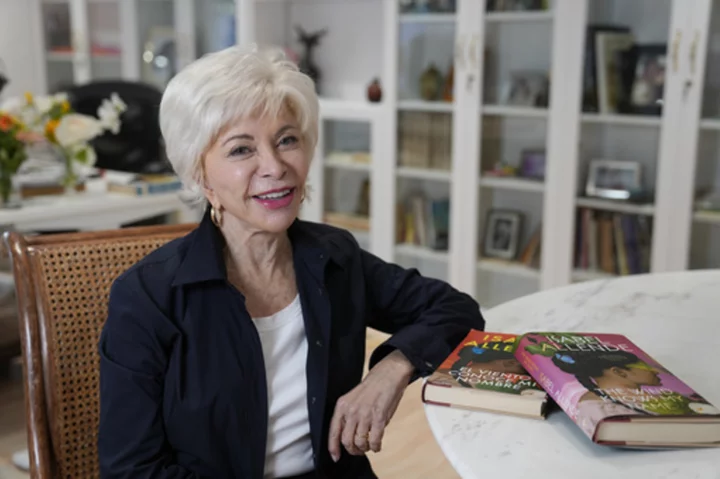MIAMI (AP) — The separation of migrant families at the U.S.-Mexico border has always caused Isabel Allende pain: When she saw it during the Trump administration, her first impulse was to help reunify children and parents through her foundation. Then, the legendary Chilean author thought, she had to write a book.
“The Wind Knows My Name,” which grapples with immigration, violence, solidarity, and love, is the latest novel by the award-winning writer who — with more than 77 million books sold — is considered the world’s most widely read Spanish-language author. Released earlier this month, it is available at bookstores in the U.S., Spain, and Latin America.
For Allende, 80, the separation of children from their parents at the border evoked similarly wrenching historical moments, such as when children of enslaved or Indigenous families were wrest from their parents.
“I thought about this awful tragedy, that is not the first time that it happens,” Allende said during a video interview with The Associated Press conducted in English and Spanish from her office in Sausalito, California. ”It is a terrible, terrible, traumatic event for parents and for the children that grow up with this hole in their heart. So that was the origin of the book.”
The novel mixes reality and fiction and delves into decisions that mothers make to save their children, such as sending them alone to another country or risking a dangerous journey together, despite the painful consequences these choices may entail. It is also a story about children’s resilience in the face of violence.
The original idea was to write a novel based on Juliana, a 7-year-old blind girl. Allende learned of Juliana through the Isabel Allende Foundation, which empowers women and girls and financially supports groups working on the border with Mexico.
Upon arriving in the United States with her family in 2019, Juliana was separated from her mother and did not appear in immigration system records. Eight months passed before, thanks to the work of pro bono lawyers, she was reunited with her parents.
While Allende did not get to meet Juliana in person — the family was deported to Mexico — the story reminded her of another tragedy, albeit with different nuances, that had moved her deeply: the family separation of some 10,000 Jewish children during the Holocaust, who were sent from Poland, Austria, Germany and other European countries to England to survive.
The result of these interwoven stories was “The Wind Knows My Name,” a 346-page novel in which Anita Díaz’s character is based on Juliana, and the character of Samuel Adler represents one of those thousands of Jewish children.
It begins at the end of 1938, with Samuel in his native Vienna. To protect him from persecution, his mother sends him to England through the Kindertransport program, which saved the lives of thousands of Jewish children during the Holocaust.
Eight decades later, Anita boards a train to escape the violence in El Salvador, seeking asylum in the U.S. She follows the path of her aunt Leticia, who had fled after surviving the tragedy of El Mozote, a 1981 massacre perpetrated by the Salvadoran armed forces that left almost a thousand people dead. The arrival of Anita and her mother in the United States coincides with the beginning of an immigration policy that splits up families, an attempt to discourage the arrival of migrants seeking asylum.
“When I write fiction, I don’t try to give a message or preach anything,” explained Allende, who has lived in California for decades and has described herself as an eternal foreigner. “I want to tell a story that I’m passionate about, that I care a lot about, and that’s what I write.”
In the case of this novel, that story was the rupture of families fleeing because of violence, poverty, or corruption, among other reasons. But the book is also a cry against immigration policies that Allende considers abuses of power, and a tribute to the thousands of lawyers, social workers, psychologists, and other volunteers who work without pay to help reunite these families.
Although much of the story takes place during Donald Trump's administration, the former president is not identified by name in the novel.
“I don’t want to put Trump’s name anywhere, it’s a personal antagonism,” said Allende. “I dislike him so much that I would rather not mention him.”
For Allende, the author of more than 25 books translated into more than 40 languages, writing a novel is like making a tapestry in which, little by little, dots are joined and colors are added. When it’s finished, she said, you feel “a tremendous relief.”
“I’ve had them in my head for a year, and they haven’t even let me sleep,” she said of the characters of her most recent novel. “They finally left.”









